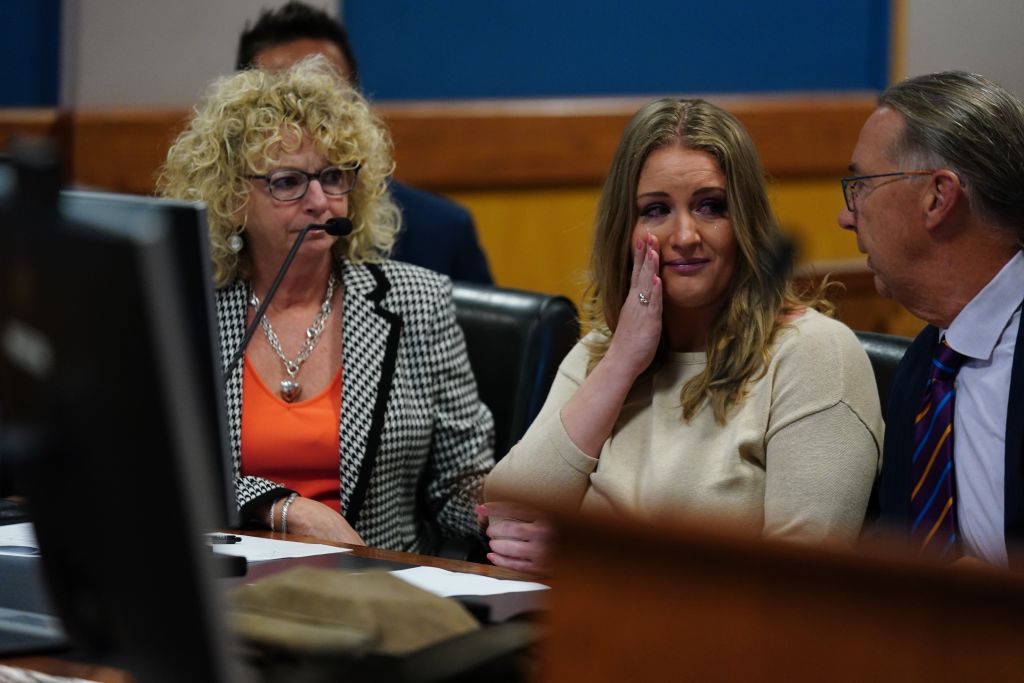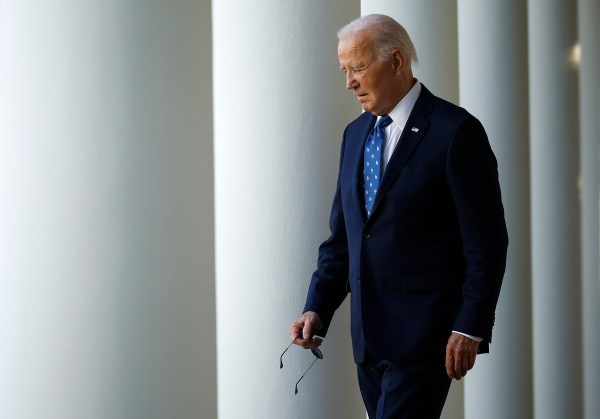I would make a poor Christian, as I find it hard to forgive.
“Everyone finds it hard to forgive,” a Christian might reply. “That’s why we need Christianity.”
Fair enough. Let me rephrase: I resent being encouraged to forgive, at least when the wrong done is substantial.
When a transgression is small and relatable, it’s churlish to hold a grudge. We’re all sinners; who am I to cast a stone at someone for lying?
But the reflexive hectoring to forgive even grandiose wrongs irritates me. Shame is a powerful deterrent. Our culture, in particular our political culture, would benefit from more of it. The cheaper grace is, the less expensive malfeasance becomes.
So perhaps we should be stingy in doling out grace to someone who committed a truly grandiose civic sin. If, say, you abetted a demagogue’s plot to keep himself in power despite having lost an election, I’ll chuck a stone at you for that.
All of this is a prelude to the spectacle that played out in Georgia on Tuesday morning. Jenna Ellis, a member of the “elite strike force” legal team that tried to overturn Donald Trump’s 2020 defeat in court, appeared before a judge to accept a plea deal in Fulton County’s criminal case against her. And she did something so uncharacteristic for a prominent Trump apologist that I wonder if it’s unprecedented.
She sounded remorseful. On camera.
I confess to having relished her public humiliation, another character flaw that would make me a poor Christian. But her anguish made me enjoy it less than I would have if she had played true to MAGA type, defiantly proud of her own corruption.
This afternoon, I’m wrestling with what we on the anti-coup side of the political divide owe a repentant Jenna Ellis. “Owe” is the wrong word, perhaps, as we might choose to forgive her—that is, to spare her from social sanction—even if we conclude forgiveness isn’t owed. Should we? Is it in our own interest to let bygones be bygones and spare her from shunning and shaming going forward?
Is it our place to forgive her at all?
I don’t know Jenna Ellis. Neither do you, probably. So in what sense is forgiveness ours to give?
She made amends today to the people of Georgia by acknowledging her guilt in aiding and abetting false statements and writings. Earlier this year, she was censured in Colorado for violating her duty as an attorney not to engage in misrepresentations. Her wrongs are being redressed by the appropriate authorities. If she’s to be forgiven, they’re the ones to provide absolution, not us, no?
No.
Ellis and her co-conspirators tried to nullify my vote by overturning the election on preposterously flimsy and conspiratorial pretenses. They would have destroyed my country and ended the American experiment for the sake of making a celebrity game-show host Caesar.
Those wrongs were done to me, personally, and to you. So forgiveness is ours to give or withhold as we see fit, however the Fulton County prosecutor’s office might feel about it.
One question we might ask in deciding how to proceed is whether or not we believe Ellis’ remorse is sincere. Earnest regret is compelling, even to grudge-holders by nature like me.
Her emotion in court seemed real. She may have been obliged by her plea deal to apologize, but she surely wasn’t obliged to sob her way through it. In fact, there’s reason to believe Ellis had a sincere change of heart about her former client even before she was indicted in Georgia.
This past spring, as Ron DeSantis prepared to enter the presidential race, she irked her friends in Trumpworld by complimenting the Florida governor on social media. The Republican primary was shaping up to be the supreme loyalty test for right-wing populists; it was unimaginable to Team Trump that someone like Ellis whom they had made famous would equivocate between their guy and DeSantis.
Online pro-Trump “influencers” turned on her, impugning her character in all the ways you’d expect. By summer, she had tilted toward DeSantis, describing him as “the best chance to save America” and questioning whether Trump still had a path to the presidency. In late August, having now been indicted, she called the governor “the best conservative candidate for 2024 by any relevant metric.”
Last month she took an additional fateful step. “I simply can’t support [Trump] for elected office again,” she said. “Why I have chosen to distance is because of that frankly malignant narcissistic tendency to simply say that he’s never done anything wrong.” Too many times, she complained without any hint of irony, Trump’s supporters have been “unwilling to put the Constitution and the country and the conservative principles above their love for a star.”
I do think it’s possible for Trump’s enablers to repent—and to mean it.
It’s unusual, and the further up the chain you go the more unusual it becomes. Joining his inner circle requires sacrificing so much credibility that at some point it becomes rational to keep doubling down on him and hoping for the best. There’s no path back to respectability for Rudy Giuliani, for instance; any public influence he wields in his final years can only be at Trump’s sufferance.
But those who don’t quite reach the tier closest to the throne are more prone to have a crisis of conscience. Stephanie Grisham, Cassidy Hutchinson, Sarah Matthews, Olivia Troye, Alyssa Farah Griffin: They all seem earnest to greater or lesser extents in repenting of their time working for Trump. Make of it what you like that they’re also all young-ish women. Is it so hard to believe that Jenna Ellis, another young-ish woman and a relatively late adopter to Trumpism, might also feel remorse earnestly? Particularly given that her work for Trump was corrupt in nature in a way that the others’ wasn’t?
I could be convinced that Ellis’ regret is heartfelt.
I just don’t think I’m there.
On August 15, the day she was indicted in Georgia, she shared this thought with her 1 million followers on The App Formerly Known as Twitter: “The Democrats and the Fulton County DA are criminalizing the practice of law.”
Twelve days later, she complained that “Donald Trump is being unjustly and wrongly persecuted by a weaponized government in Georgia. … Ron DeSantis should directly address and condemn the Georgia indictment of Donald Trump. Do the right thing regardless of the outcome.”
A few weeks after that, a critic told her that she should be ashamed of herself for getting indicted. “I’m innocent,” Ellis answered. “Why would I be ashamed of that?”
Her remorse, it seems, is a recent development.
Ellis hasn’t tweeted about her guilty plea as of this writing, but I share Griffin’s curiosity as to how remorseful she’ll sound once she’s back addressing her online audience of election cranks and populist goblins instead of a judge in Georgia. Those cranks have been good to her, you know:
They’re going to want to know what they got for their money besides a teary admission that she should never have taken on their hero, Donald Trump, as a client.
It’s hard not to notice that her distaste for Trump’s “malignant narcissistic tendency” ripened only after his toadies on social media had unpersoned her for being too friendly toward DeSantis. Was that tendency not clear enough when she chose to help him subvert a national election, a project that sent innocent people into hiding in fear for their lives?
In her statement before the court on Tuesday, ostensibly given to acknowledge responsibility for her actions, Ellis snuck in this bit of buck-passing: “I relied on others, including lawyers with many more years of experience than I, to provide me with true and reliable information, especially since my role involved speaking to the media and to legislators in various states.” To hear that, you might think she was guilty of nothing more than too credulously relaying to the public what the voices in Rudy Giuliani’s head were telling him about fraud in Georgia.
But Ellis was more than a mouthpiece. She strategized about how to give the coup a patina of lawfulness:
A few days before the 2020 election was slated to be certified by Congress, the lawyer Jenna Ellis sent President Donald J. Trump a memo suggesting a way he could stay in power by upending the normal course of American democracy.
In the memo, Ms. Ellis, who had little experience in constitutional law, offered Mr. Trump advice he was also getting from far more seasoned lawyers outside government: to press his vice president, Mike Pence, who would be overseeing the certification ceremony at the Capitol on Jan. 6, 2021, not to open any Electoral College votes from six key swing states that Mr. Trump had lost.
She knew what she was doing, the babe-in-the-woods routine before the court notwithstanding. In fact, members of Team Trump knew better than average joes like you and I did that there was no merit to his “rigged election” nonsense. Yet, months after Joe Biden was sworn in as president, Ellis was still grumbling on social media about things Pence could have done to slow down the certification of Biden’s victory on January 6.
In context, the tears we saw this morning before the judge seem less the product of conscientious agony over a great moral mistake than the product of frustration at having been abandoned by Trump and forced to take a deal rather than bear the financial burden of a prolonged criminal defense.
No one is “owed” forgiveness, I would argue, although forgiveness may always be charitably granted. But when repentance is hollow, charity seems like foolishness.
Besides, MAGA heroes never forgive. They glory in their vindictiveness. Why shouldn’t I do so in this case?
The New Right treats its enemies’ worst impulses as moral license to behave as badly as they do. I won’t stoop to that with respect to how state power is applied—Jenna Ellis deserved the rule of law in court, her contempt for it in 2020 notwithstanding—but I don’t mind delivering a taste of one’s own medicine when it comes to social sanction. Vindictiveness as a general political ethic is corrosive and nihilistic, but vindictiveness applied discriminately, to deter truly egregious behavior, feels more like hygiene.
I resent forever being asked to be “better” than amoral populist cretins, in the same way Democrats resented being asked to bail out Kevin McCarthy when Matt Gaetz and his allies staged a minor coup of their own. Republicans, Democrats argued, made their bed by empowering illiberal grandstanders like Gaetz. Now let them lie in it. There are lessons to be learned from pain.
I’m inclined the same way with respect to Ellis. She was plainly seduced by the glamor of representing a crook in a legal dispute the entire planet was watching. She’s obviously enjoyed the clout she earned among grassroots Republicans by doing so. She made her bed. If being shunned and shamed by decent people indefinitely is painful for her, good. The coup-plotters of tomorrow will profit from her example.
It won’t surprise me, in fact, if she turns around and endorses her former client with “malignant narcissistic tendency” for president next year, whatever she might say to the contrary at the moment. She’ll never be accepted by Trump’s critics; she may as well do what she can to repair the bridges on the right that she’s burned.
But isn’t that in itself cause to forgive her?
Forget the morality of doing so. Forget what she’s “owed” or whether her remorse is sincere. This is politics, and politics in a democracy is about building a coalition that’s bigger than the other team’s. If forgiving Jenna Ellis makes her feel more comfortable in her newfound “Never Trump” position, that sounds like something Never Trumpers should maybe consider doing as a matter of basic pragmatism.
Call it “strategic forgiveness.” You want Trump cultists to leave the cult? Then give them a reason to think their lives will get better by leaving. Knowing that you’ll be ostracized forever by the outside world if you renounce MAGA is a great argument for never renouncing MAGA.
I’m persuadable on that point. I’ve been persuaded, in fact, with respect to Grisham, Farah, and the rest. If a truly consequential figure in the MAGA kingdom defected—although I’m not sure there’s anyone truly “consequential” beside Trump himself—I’d consider granting them moral asylum in exchange for their help in defeating him next year. Heck, have you seen me write a newsletter condemning the highly compromised Bill Barr now that he’s become a Trump antagonist?
I’ll grant strategic forgiveness, or a simulacrum of it—but not to Ellis. Not to any henchman who undertook to plunge this country into a crisis that might plausibly have led to its dissolution if only Mike Pence had cooperated. Especially not to the lawyers among them, who knew best of all how dubious the plot was and went forward anyway. Not Rudy, not Sidney Powell, not Jeffrey Clark, not John Eastman. Not Ellis.
God forgives all sins. You and I don’t have to.
The defections obtained by forgiveness wouldn’t be worth anything anyway, frankly. John Eastman wouldn’t bring any voters with him if he belatedly joined Team Never Trump. And you know what? Even if we offered him and the rest forgiveness, I doubt they’d accept it. It’s one thing to whimper for mercy before a judge, but it’s another to accept grace from enemies whom you’ve demonized remorselessly for years in order to rationalize your own moral corruption.
Jenna Ellis might apologize to a court, but I doubt she’d ever apologize to those like you and me who, quite justifiably, take it personally that she made herself into an enemy of liberal democracy. We were right and she and her colleagues were wrong—and that’s something they’ll never forgive us for.
No redemption, then. Not from me, anyway. Although if she ends up flipping and sending the rest of Team Coup to prison, I reserve the right to reconsider.









Please note that we at The Dispatch hold ourselves, our work, and our commenters to a higher standard than other places on the internet. We welcome comments that foster genuine debate or discussion—including comments critical of us or our work—but responses that include ad hominem attacks on fellow Dispatch members or are intended to stoke fear and anger may be moderated.
You are currently using a limited time guest pass and do not have access to commenting. Consider subscribing to join the conversation.
With your membership, you only have the ability to comment on The Morning Dispatch articles. Consider upgrading to join the conversation everywhere.